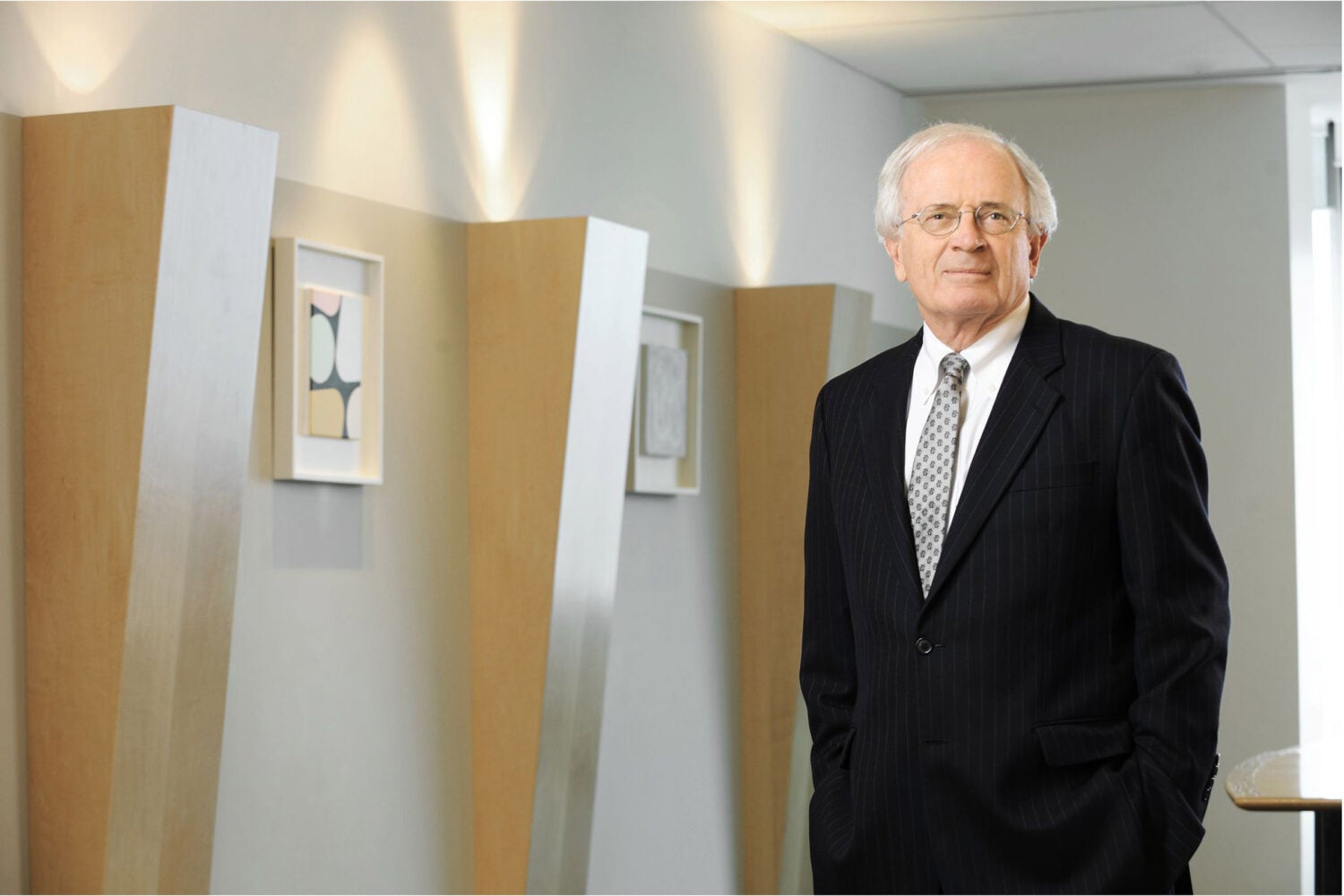Sir David A.R. Williams LL.M. ’66 recently retired after more than five decades as a litigator, environmental advocate, author, law professor, judge, and international arbitrator. One of the first practitioners of international arbitration in New Zealand, Williams has been involved, often as president of the tribunal, in over 150 international commercial and investment treaty arbitrations, as well over a dozen significant cases before the Court of Arbitration for Sport. He also served as a judge on the High Court of New Zealand, and as the chief justice of the Cook Islands, an independent island nation that maintains a connection with New Zealand. In 2017, Queen Elizabeth II recognized his contributions to international law and arbitration by naming him a Knight Companion of the New Zealand Order of Merit.
Williams attributes much of what he pioneered in New Zealand to his experience at Harvard and associated opportunities, which is particularly ironic considering that he only studied law at the insistence of his father and certainly never intended to pursue graduate law studies. It was only due to a chance meeting with an American lawyer during his LL.B. studies at the University of Auckland that Williams even considered pursuing an LL.M. in the United States. “In those days, my law school friends considered overseas graduate study a rather useless step,” he recalls, “and if you were silly enough to take that route, you’d go to Oxford or Cambridge.” But the dean of the law faculty, who had studied at the University of Toronto, encouraged Williams to study in North America, and to his “great astonishment,” Harvard Law School admitted him to its LL.M. program and offered him the scholarship funding that enabled him to attend. Williams’s LL.M. class of 71 students was, at the time, the largest in the school’s history, and represented 26 countries: “There was a very congenial feeling because the students were delightful and interesting people, and I formed great friendships,” he adds, noting that Sir Kenneth Keith, who later became a Professor of Law at the Victoria University of Wellington and served as a judge on the International Court of Justice, was at HLS at the same time.
Williams describes his time at Harvard as “an amazingly good experience, and incredibly stimulating – the quality of the teachers was breathtaking.” Among many highlights, Williams studied international law with Richard Baxter ‘48, an expert on the law of war who later served as a judge on the International Court of Justice; U.S. constitutional law with Archibald Cox ‘37, who had just returned to Harvard after serving as solicitor general; and antitrust law with Phillip Areeda ’54. He also focused on environmental law, a subject that he found especially interesting (so much so that when he later found out there was no textbook on New Zealand’s environmental laws, he wrote one himself).
After graduating, Williams spent a summer at the Boston law firm Ropes and Gray before returning to New Zealand. Shortly thereafter, he joined a top New Zealand firm, Russell McVeagh, as a litigator, and was asked to handle two cases that were going into international arbitration — the first in New Zealand – having been introduced to the concept during his studies at Harvard. It marked the beginning of a long and illustrious arbitration career spanning multiple continents. Among other high-profile matters, Williams presided over the tribunal that upheld the decision to strip Floyd Landis of his 2006 Tour de France title for a doping offense. He also co-authored New Zealand’s first comprehensive treatise on domestic and international arbitration.
After making partner at Russell McVeagh, Williams urged the firm to establish a summer program inspired by his experience at Ropes and Gray, and other New Zealand firms soon followed. “I can proudly tell you that this established the summer clerkship routine in New Zealand!” he laughs.
And in 1971, Williams helped found New Zealand’s Environmental Defence Society, inspired by a lecture he had attended at Harvard given by Charles Wurster, a founding member of the U.S. Environmental Defense Fund, which had been instrumental in banning the use of the pesticide DDT. After the lecture, Williams had followed up with Wurster, and they had continued to discuss the organization’s work over the years.
In recognition of Williams’s many accomplishments, Auckland University Law Review’s 2021 Special Issue on Arbitration opened with an editorial celebrating Williams. Notably, in the preceding issue, Williams himself had contributed a special feature extolling the benefits of international postgraduate studies for New Zealand law graduates, placing special emphasis on the ways in which HLS had helped him throughout his career.
Today, Williams is an associate member of Bankside Chambers in Auckland; he is proud to point out that his colleagues there include recent Harvard Law graduates Kingi Snelgar LL.M. ’16 and Tiaan Nelson LL.M. ‘22.
